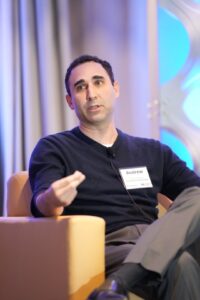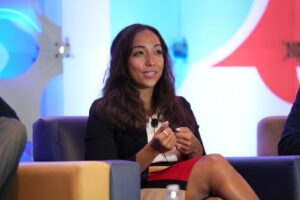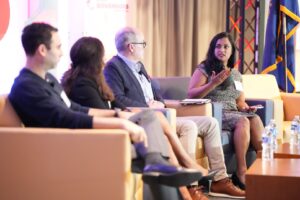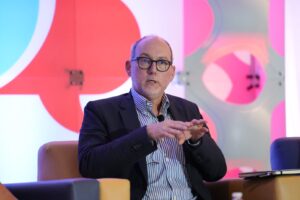Through his Chair’s Initiative: Disagree Better, National Governors Association Chair Utah Governor Spencer Cox aims to elevate solutions to toxic polarization. At a convening in New Hampshire, Governor Cox welcomed representatives of several national organizations leading efforts to find common ground.
Two panel discussions featured strategies for correcting misperceptions and highlighting commonalities at the individual level, while a third focused on taking those one-on-one connection strategies and scaling them to the community level.
The panel featured:
- Uma Viswanathan, New Pluralists
- Ron Gunzburger, Story Corps
- Layla Zaidane, Millennial Action Project
- Andrew Hanauer, One America

Andrew Hanauer explained the inspiration behind the panelists’ efforts to foster connection that bolsters institutions. “What we need to be doing [is to] stand up those pillars of society that already exist, that already are involved in people’s lives so that they can be as healthy as possible.”
Hanauer’s organization, One America, focuses on faith communities. “When we think about any institution in American society that we need to be healthy – [such as] corporations, government elected officials – faith is one of them. And right now, the institution of faith in America is most threatened by the exhaustion and the burnout among its leadership – and the reasons they cite for that burnout are largely around the isolation and loneliness they feel because of the divisions within their community.”
Hanauer identified toxic polarization as a “spiritual crisis,” driven by the increasing tendency of Americans to elevate their partisan identity above all else. One America works to counter the trend by helping leaders and members of faith communities emphasize “an identity that is outside of partisan politics, that, in fact, transcends partisan politics and actually is embedded in a set of norms and values and traditions and beliefs that help us respond to the toxic polarization in our country.”

Layla Zaidane’s organization, the Millennial Action Project, applies the same concept in a legislative context – working with millennial and Gen Z elected officials and “connecting them along a generational identity and not a partisan identity.”
Active in 33 states and the U.S. Congress, the Millennial Action Project has worked with 1,600 young elected officials to bridge the partisan divide – establishing a Future Caucus in multiple state legislatures.
“By connecting them along a generational identity and not a partisan identity, you introduce this really interesting cross-section of perspectives,” Zaidane said. Through Future Caucuses, young lawmakers “have been able to build a permission structure for other young elected leaders to become friends with people across the aisle to start identifying policy opportunities… and create this vehicle that enables these young public servants to imagine what they can bring to the American experiment, to the endeavor of solving problems for the greater good.”
The efforts have borne fruit. According to the organization’s calculations, “one in six state lawmakers is a young person, but last year one-third of all bipartisan bills enacted were authored by a young person.”

Uma Viswanathan’s organization, New Pluralists, also has its roots in the public policy realm. Centered around the concept that America’s founding ideal “of pluralism… [is] so foundational to our democracy that [it] actually needs to go hand in hand with our democracy,” New Pluralists partners with organizations like Braver Angels, One America and More in Common to foster a culture of pluralism in America.
Key to the group’s work is recognizing diverse views as a strength, not an obstacle, in American life.
“Diversity is not just something we have to manage around,” Viswanathan stated. Embracing Americans’ “diversity of perspectives and beliefs” actually leads to “better solutions.”
It’s up to all of us, however, to create a culture that values pluralism. New Pluralists emphasizes several principles to achieve this goal, including “take responsibility for repair.”
“As a diverse, multiracial, multi-faith [nation], we are going to harm each other,” Viswanathan explained. “That’s just simply what’s going to happen. But do we have the capacity, and do we have the will to be able to take responsibility, to repair our relationships again and again? That is what it means to be part of a thriving, diverse democracy.”
At Story Corps, Ron Gunzburger is engaged in just this kind of work. Building on NPR’s longstanding program that records Americans in conversation with each other, Story Corps’ “One Small Step” project tweaked the formula to feature dialogue “bringing a conservative and a liberal together, and to have a conversation, not about politics, but about their lives – to try to find and see the humanity in each other.”

Much like Disagree Better, Story Corps aims not to erase political differences but to overcome them.
“We’re not trying to make people change their minds,” Gunzburger said. “We’re trying to see the humanity in each other. And the one fascinating thing so far, which always comes as a surprise to people is… that when you sit across from someone, it’s hard to hate up close. You come away liking the person you sat with. They go away largely as new friends.”
One Small Step is active in four cities and on Capitol Hill, where it brings members of Congress together in conversation with counterparts across the aisle. Gunzburger relayed how one congressional participant lamented that “none of us wants” toxic polarization but “none of us can turn it off.”
Step by step, the organizations represented on the panel are dedicated to helping America “turn off” partisan division. The panelists underlined the importance of coordinating their work to make a greater impact.
“The reality is, we’re all just pieces of the puzzle,” Gunzburger said. “The challenge is building an ecosystem and scaling up for a critical mass. Because it’s only when we start truly working together that something’s going to happen.”
The first Disagree Better convening helped spur that collaboration – putting a spotlight on the good work underway across several organizations and bringing them together. By highlighting and harnessing their work, Governor Cox’s initiative aims to help the members of the exhausted majority find each other and work together to turn the tide.












